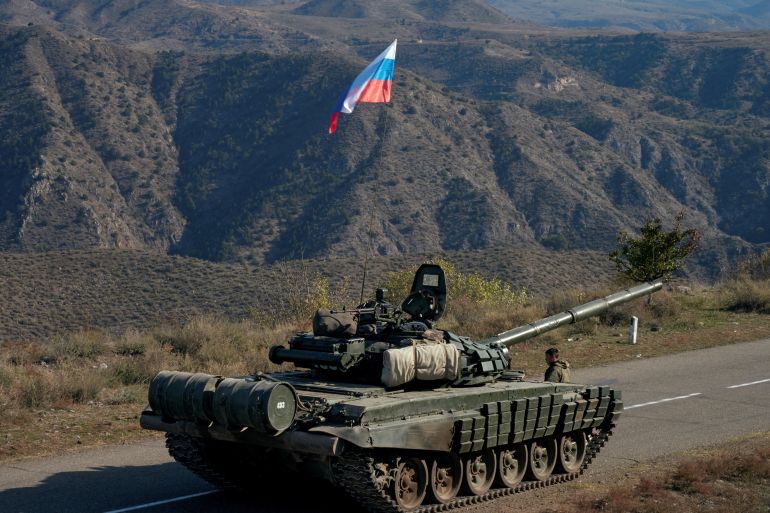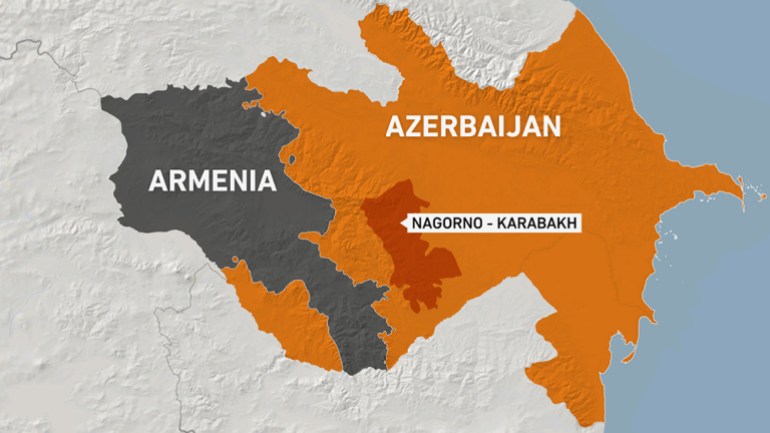UN court orders Azerbaijan to end Nagorno-Karabakh roadblock
The Lachin Corridor, the only land route giving Armenia direct access to Nagorno-Karabakh, has been blocked since December 12.

The highest court of the United Nations has ordered Azerbaijan to remove a roadblock from the only road between Armenia and the Armenian-majority Nagorno-Karabakh region in Azerbaijan that has further fuelled tensions between the two countries.
The legally binding 13-2 ruling made on Wednesday by the International Court of Justice results from the latest legal skirmishes in a long-running fight between Armenia and Azerbaijan over Nagorno-Karabakh.
Keep reading
list of 3 itemsIran says embassy attack should not affect Azerbaijan relations
One person dies in attack on Azerbaijan’s embassy in Iran
Each country filed a case with the court accusing the other of breaching a convention aimed at stamping out racial discrimination.
Wednesday’s ruling on the blocked road, known as the Lachin Corridor, was handed down just over two years from the end of a war between the neighboring nations in Nagorno-Karabakh that killed about 6,800 soldiers and displaced 90,000 civilians.
The remote and rugged region is within Azerbaijan but had been under the control of ethnic Armenian forces backed by Armenia since the end of a separatist war in 1994.
A ceasefire brokered by Russia ended the 2020 war and granted Azerbaijan control over parts of Nagorno-Karabakh as well as adjacent land occupied by Armenians. Russia sent a peacekeeping force of 2,000 troops to maintain order.
Armenia’s lawyers said during court hearings last month that the roadblock set up late last year by protesters who said they were environmental activists was part of an Azerbaijani campaign that the Armenians labeled “ethnic cleansing”.

International Court of Justice President Joan Donoghue said the evidence presented by Armenia established that the blockade “has impeded the transfer of persons of Armenian national and ethnic origin hospitalised in Nagorno-Karabakh to medical facilities in Armenia for urgent medical care”.
It also interrupted supplies to Nagorno-Karabakh of “essential goods, causing shortages of food, medicine and other lifesaving medical supplies”, Donoghue said.
In their majority decision, the court’s judges ordered Azerbaijan to “take all measures at its disposal to ensure unimpeded movement of persons, vehicles and cargo along the Lachin Corridor in both directions”.
They rejected Armenia’s request for an order for Azerbaijan not to block gas supplies to Nagorno-Karabakh, saying that Armenian lawyers did not provide enough evidence to back their claim that Azerbaijan was disrupting those supplies.
The judges also declined a request by Azerbaijan for an order to stop or prevent Armenia from laying landmines and booby traps in areas of the region to which Azerbaijani citizens are to return.
The world court ordered both nations a little over a year ago to prevent discrimination against one another’s citizens in the aftermath of the war and to not further aggravate the conflict.
Fighting between the two former Soviet republics erupted last year and killed almost 200 soldiers in the bloodiest confrontation since the six-week war in 2020.